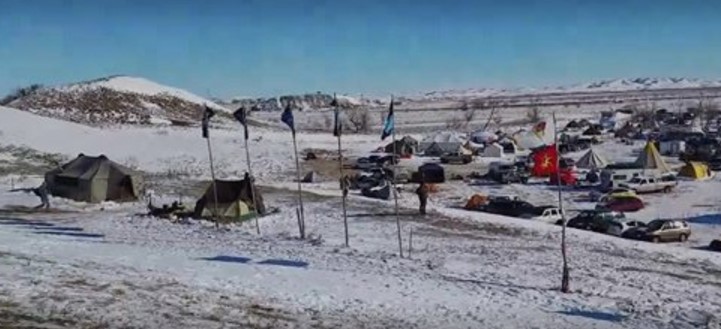DAPL opponents cautiously optimistic after Army Corps denies easement

The company behind the Dakota Access Pipeline says they have no intention of rerouting, despite the Army Corps of Engineer’s refusal to grant an easement required to bore beneath the Missouri River near the Standing Rock Sioux Reservation. What was jubilation at the news Sunday has morphed into cautious optimism – at best – for the thousands of people opposing the project. FSRN’s Nell Abram has more.
Sunday afternoon, Kandi Mosset of the Indigenous Environmental Network climbed a hill adjacent to the Oceti Sakowin camp to livestream about a major development and said, “Moments ago, the White House made an announcement that they are going to deny the permit to bore beneath, the Army Corps of Engineers will deny the permit to bore underneath the Missouri River.”
The statement from the Department of the Army’s Assistant Secretary for Civil Work, Joanna Darcy, said that alternate routes for the pipeline must be explored, and the best way to do that is to conduct an Environmental Impact Statement. Under existing regulations, there is no federal purview over multi-state pipeline projects. So permitting for the nearly $4 billion dollar project was done on a leg-by-leg basis, with a far less rigorous environmental assessment. An Environmental Impact Statement would require reviewing the project in its totality.
Mosset described a joyous celebration at the camp’s sacred fire, where a human circle formed and people joined hands in song and prayer. But the jubilance was tempered by the fact that an investor in the company building the pipeline is weeks away from becoming the president of the United States.
“So, we remain totally happy here, but we remain vigilant and we remain pushing for a full environmental impact statement for the over 1100-mile, four state pipeline,” Mosset explained.
And that vigilance may not be misplaced. Shortly after the announcement, Energy Transfer Partners – the developers of the project – released a statement saying the company fully expects to complete pipeline construction, without rerouting. It’s unclear if that means they plan to forge ahead with construction without the easement, or if they simply view this as a delay until after President Obama steps down.
Either way, Standing Rock Sioux Chairman Dave Archambault quickly released his own statement praising the Obama administration for taking steps “to correct the course of history and to do the right thing.”
Thousands of people currently in the camp are U.S. military veterans who arrived over the weekend to protect and serve those who plan to ride out the freezing winter to prevent pipeline construction from advancing.
As part of a welcoming ceremony held on the Standing Rock Sioux reservation Monday, a group of veterans kneeled before Native American elders and apologized for past crimes committed against the region’s original residents – carried out or enabled by then-members of the U.S. armed forces.
“We came we fought you, we took your land, we signed treaties that we broke, we stole minerals from your sacred hills, we blasted the faces of our presidents on your sacred mountain. We took still more land, then we took your children – and then we tried to take your language,” one of the veterans said. “We didn’t respect you – we polluted your earth. We’ve hurt you in so many ways and we have come to say we are sorry, we are at your service, and we beg your forgiveness.”
But even as the exchange played out, more news broke. Reuters reports that the co-chairs of the president-elect’s Native American Affairs Coalition are recommending the privatization of energy-rich reservation lands – a complex proposition that could deeply divide Native Americans and open a pathway to deregulated drilling.
Today is the deadline to clear the Oceti Sakowin camp under an Army Corps eviction notice issued a week ago, which North Dakota Governor Jack Dalrymple followed with an evacuation order. But thousands of people still there show no plans of leaving.











